The vital tradition of naming baby gorillas
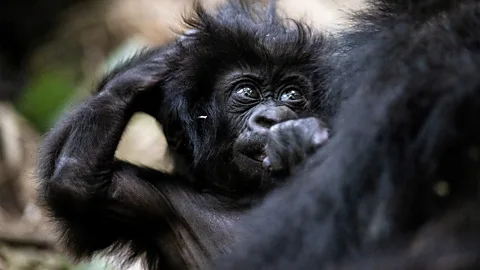 Kwita Izina
Kwita IzinaMountain gorilla conservation in Rwanda is a global success story, partly due to the significance and value placed on gorillas as part of the nation's culture and heritage, with annual celebrations of baby gorillas being born.
In a sunlit spot of mist-cloaked rainforest, a black, hairy mass of muscle descends surprisingly gracefully down a thick mossy vine. The huge silverback stretches out and settles in for a thorough grooming session from a female, totally unfazed by his human admirers. Two teenagers tumble into view, beating their chests and grimacing at each other, a tangle of limbs in mock combat, while an adorable baby gorilla peers shyly from her mother's arms at the unfolding family drama.
Seeing mountain gorillas in the wild is a magical bucket list experience, but it wasn't always this way. Poachers decimated gorilla numbers in the 1960s and 70s, leaving them at risk of extinction. Then came the Rwandan genocide in 1994. Volcanoes National Park, home to most of Rwanda's mountain gorillas, became a battlefield as the civil war raged across the country, with population numbers struggling to rise above 300.
It's hard to fathom how Rwanda has managed to tackle the challenges of its traumatic past in such a short space of time, let alone become a beacon of conservation success. Yet today, mountain gorillas are the only great ape whose numbers are not rapidly descending. WWF estimates that mountain gorilla numbers have risen 3% every year since 2010, moving them in the right direction from "critically endangered" to "endangered" on the IUCN Red List of Threatened Species – and this success largely comes down to Rwanda's sustained conservation efforts, which include anti-poaching patrols, community engagement and regulated gorilla tourism, all of which have helped to protect habitats and ensure that local people benefit from the survival of these great apes.
Three hundred and ninety-five baby gorillas have been born since 2005 in Rwanda, and each year since then these new arrivals have been celebrated in a uniquely Rwandan way. Kwita Izina, or "to give a name" in the country's national Kinyarwanda language, is Rwanda's huge annual gorilla naming ceremony that honours each gorgeous fuzzy baby born in Volcanoes National Park with a meaningful moniker. The ceremony, which is celebrating its 20th anniversary this year, is inspired by the centuries-old Rwandan tradition where families and communities would gather together to name their newborns. Since Kwita Izina began, it has played a major role in raising awareness of gorilla conservation.
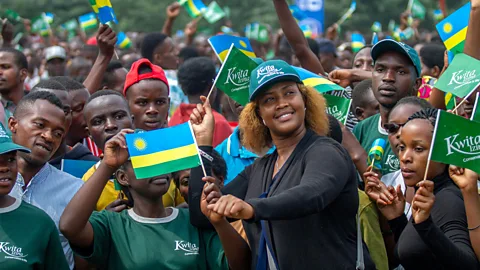 Alamy
Alamy"It's a great story of success to mark this progress of a species that was in decline and on the edge," says Praveen Moman, founder of Volcanoes Safaris and the first international tour operator to kickstart gorilla tourism in Rwanda after the genocide. "First it was small and local and symbolic, just for the rangers and those involved in conservation. Now the government has made this an international and recognisable event to highlight conservation success."
Rwandans place great significance on a person's name, and so the button-cute babies are given names based on their personality or events surrounding them at the time of their birth. Last year actor Idris Elba named a baby gorilla "Narame", meaning "long life", because its mother had previously lost two children; and primary school student Elvine Ineza named a female baby "Nibagwire", meaning "multiply" and chosen to wish the newly formed Sigasirie family continued growth.
Tens of thousands of people, including celebrities, conservationists and local communities, now come together at the foothills of the ancient volcanoes for the annual spectacle held every autumn (the confirmed date for 2025 has yet to be announced by the Rwanda Development Board). As well as the official ceremony, dominated by a house-high bamboo gorilla sculpture, there are hours of music, dances and performances from the warrior-like Intore dancers pounding the ground in time to drums to cultural villages showcasing Rwandan daily life.
As well as raising global awareness, Kwita Izina is also a cultural celebration of the country's collective efforts to protect the great apes and a way of saying thank you to the communities and conservationists who protect them. Irene Murerwa, chief tourism officer of the Rwanda Development Board tells the BBC that Kwita Izina serves the purpose of thanking the local community before everything else. "It's because of the community and it's for them as well," she says.
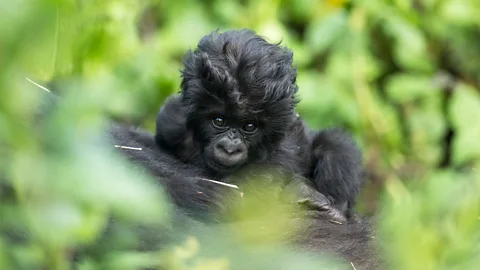 Kwita Izina
Kwita IzinaTiming a visit to Volcanoes National Park during Kwita Izina is highly worthwhile, but the meaning behind it is really what's key, according to Murerwa. "It's not just the baby gorilla naming ceremony. It's the whole aspect of visiting. Guests can take advantage to understand how communities, tourism and conservation come together here," she says.
A dramatic blend of striking volcanic mountains, ethereal montane forests and neat, terraced hills that roll endlessly across the countryside, Rwanda is tiny but one of the most densely populated countries in Africa. Space is limited, so people living near the gorillas must have incentives to protect them. "If you want to save the gorillas you need to focus on the people, because these are tiny, fragile habitats, surrounded by some of the most densely populated areas of the world," says Moman.
Plan your trip
How to get here:
Fly into Rwanda's capital Kigali. From Kigali, it takes between two to three hours to drive to Volcanoes National Park's headquarters in Kinigi, Musanze, where the naming ceremony is also held. Lodges usually provide transfers or car hire and taxi services are available.
When to go:
The long dry season between May and October. Kwita Izina is usually held every autumn.
Where to stay
:
,
and
What to do:
Gorillas are the star attraction but golden monkeys are also endemic here (permits are needed for both). If visiting during the week-long Kwita Izina festivities, organise tickets through your lodge or tour operator.
"Unless local people see some specific benefit from tourism and conservation, there's no reason why they should support the future of the gorillas, and equally importantly, the future of the habitat. What they need is farmland and bread on the table. From the small number of visitors, you need to make enough of an impact through the income and make sure that some of it is shared with the community."
More than 1.4 million travellers visited Rwanda in 2023, generating a record US$620m. At $1,500 per permit, watching gorillas is an eye-wateringly expensive experience. Yet, income from gorilla tourism provides vital funding for the continued protection of the park and animals within and, crucially, 10% of the park fee revenue goes to the people who live around the park margins to help build schools and houses, improve infrastructure and sanitation, provide clean water and support health centres. This impactful funding has transformed villages and encourages stewardship of the forests.
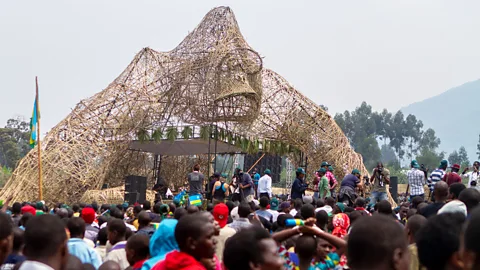 Alamy
AlamyTourism now also provides thousands of people with livelihoods. Greg Bakunzi, founder of Red Rocks Rwanda, a social enterprise integrating tourism, conservation and sustainable community development in and around the Volcanoes National Park, says, "Kwita Izina helped to mobilise communities and people who were interested in conservation and tourism to be a part of the growing tourism industry."
Red Rocks Rwanda offers safari tent accommodation, gorilla trekking and many immersive activities throughout the year for visitors, and Bakunzi now also hosts the annual Red Rocks Cultural Festival that aligns with the dates of Kwita Izina and features music, poetry, comedy, art, exhibitions and talks about conservation and community empowerment.
"I wanted to create a week-long event that could also integrate community conservation when travellers come for the naming ceremony," he says. "The culture of the communities are intricately tied to the natural world surrounding them. They preserve not only the Virungu Mountain environment but also the historical cultures and traditional arts of the region, gaining access to sustainable sources of income from tourism."
Over at the Gorilla Guardians Village in the small town of Kinigi, which is also home to the park headquarters, former poachers have swapped snares for stories. Visitors can immerse themselves in Rwandan dance, craft and food, make Rwanda's potent banana beer, learn traditional skills like fire-making and archery and hear the tales of the people who used to hunt in the forest. Also in Kinigi, upscale Sabyinyo Silverback Lodge is Rwanda's first community-owned lodge. The pretty stone cottages and access to gorilla trekking provide an income for many local people and also support healthcare, infrastructure and education projects, such as building homes for widows of the Rwandan genocide and new classrooms for children.
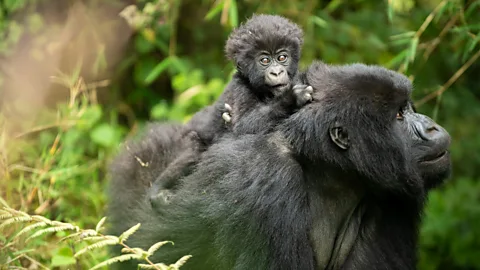 Kwita Izina
Kwita IzinaEunice Umumararungu, assistant manager at Sabyinyo, told me, "Everyone's job is vital to successful conservation. From the porters, trackers and guides to research partners, rangers and those who are involved in the tree planting initiatives – they are all ensuring future naming ceremonies as the gorilla population grows thanks to conservation efforts. Kwita Izina has helped all Rwandans from various communities to understand the value of gorillas and their contribution to the country's economic prosperity."
Cementing the region as a conservation hub is the Ellen DeGeneres Campus of the Dian Fossey Gorilla Fund, which opened in 2022 just outside the park. As well as being an education and research centre for the next generation of conservation leaders, visitors can take quizzes to find out which gorilla matches their personality, leaf through Fossey's field notes in a highly realistic version of the acclaimed primatologist's research camp and explore 12 acres of beautifully landscaped grounds.
Gorilla families are doing so well now that Volcanoes National Park is being expanded to give them more space. In addition, a Conservation Master Plan, published later this year, will set out guidance for the protection and management of all Rwandan biodiversity. As people are seen as important stewards of conservation in this nation, those who will have to relocate out of the expanded national park will be supported with new livelihood opportunities and improved living conditions.
"Kwita Izina has really put our name on the map," says Bakunzi. "It has brought us more global visibility and has shown people why conservation matters."
--
If you liked this story, sign up for The Essential List newsletter – a handpicked selection of features, videos and can't-miss news, delivered to your inbox twice a week.
